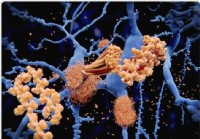Polycystic ovarian syndrome (PCOS) is one of the most prevalent endocrine-metabolic disorders in women. PCOS occurs when a woman’s hormonal profiles are altered; there is a rise in testosterone and other male hormones, ovulation is suppressed and, in many cases, insulin resistance develops. The exact cause of PCOS and it’s associated hormonal imbalances is unknown. Women with PCOS can struggle with infertility and weight gain, as well as with excessive facial and body hair growth, hair loss, type II diabetes and, as importantly, irregularities in the menstrual cycles.
There are two subsets of PCOS:those that become overweight and those who retain normal body mass index. While nutrition and lifestyle changes are important in both, normal weight women pose a harder challenge in treatment of PCOS. If you suffer from PCOS, it’s important to work with your doctor to manage your condition!

Women with PCOS can struggle with infertility.
Early diagnosis and treatment, along with nutrition and lifestyle, and weight loss in those that are overweight, may reduce the risk of long-term complications such as type 2 diabetes, heart disease and trouble conceiving. Research has shown the powerful role that lifestyle and the microbiome play in the development of PCOS, as well as in the management of it. When using lifestyle to treat PCOS, the primary focus is to alter our most basic habits:food and movement. We want to be eating foods that nourish the body – that contain fiber and nutrients – and developing an exercise routine that works for us. These changes help to lower insulin resistance (and reverse or better manage type 2 diabetes, if present), create a healthier microbiome, support hormonal balance and achieve weight loss.
When developing a healthier lifestyle pattern, we must avoid crash diets, diet pills that induce rapid weight loss and excessive exercise regimens, all of which can further inhibit our ovulation cycles. Though all these things can lead to dramatic changes in the short-term, they are unsustainable. Instead, we need to focus on our long term goal:real and sustainable changes that leads to better overall health.
How to start creating healthier eating habits:

Fill your plate with colorful fruit and vegetables to combat PCOS!
Exercise increases insulin sensitivity while assisting in weight management. Studies have shown that exercise reduces total testosterone levels and body hair growth. Women who experience PCOS should aim for 30+ minutes of aerobic exercise 4-6 days per week, plus resistance training on 2 different days. The key in maintaining an exercise routine is finding a discipline that you enjoy doing.
If you like nature, try walking or jogging in a park near your house. You may enjoy swimming, rock climbing or crossfit- the sky’s the limit when it comes to your exercise routine. The key is finding an exercise you want to do for fun or leisure; not with a focus of weight loss or a specific body shape.

Women who experience PCOS should aim for 30+ minutes of aerobic exercise 4-6 days per week, plus resistance training on 2 different days.
In several studies, patients with PCOS show a lower diversity in their gut microbiome compared to controls, with an increase in firmicutes species and a decrease in Bacteroidetes species. This imbalance, or dysbiosis, in the gut microbiome may lead to increased intestinal permeability, systemic inflammation and increased risk of insulin resistance.
Tips to begin increasing the diversity of your microbiome:
In conclusion:Though the etiology of PCOS is not fully understood, lifestyle factors do play a crucial role in the treatment of polycystic ovarian syndrome. Developing healthier eating habits, creating a daily physical activity regimen and supporting the gut microbiome have been shown to improve metabolic and reproductive parameters in women who experience PCOS.

Developing healthier eating habits, creating a daily physical activity regimen and supporting the gut microbiome have been shown to improve metabolic and reproductive parameters in women who experience PCOS.
To optimize your Gut Health, download Dr Mendez Gut Health Guide! If you are looking for support to help improve your diet and boost your gut microbiome, then get in touch today or register to make an appointment to discover how Doctor Méndez can help you to optimize your health.
Written in collaboration with Natalia Diaz Villarreal.
References:
Azziz, Ricardo. (2018). Polycystic Ovarian Syndrome. Obstetrics &Gynecology, 18, 321-336.
Xiaoxuan Zhao, Yuepeng Jiang, […], and Xiaoling Feng. (2020). Exploration of the Relationship Between Gut Microbiota and Polycystic Ovary Syndrome (PCOS):a Review. Geburtshilfe und Frauenheilkunde, 80, 161-171.
Norman, R., Davies, M., Lord, J., Moran, L. (2002). The role of lifestyle modification in polycystic ovary syndrome. TRENDS in Endocrinology &Metabolism, 13, 251-257.
 Los coronavirus humanos necesitan materiales orgánicos para transferirse de manera eficiente entre superficies
Los coronavirus humanos necesitan materiales orgánicos para transferirse de manera eficiente entre superficies
 Los antioxidantes en la dieta podrían aumentar el riesgo de cáncer de intestino,
Los antioxidantes en la dieta podrían aumentar el riesgo de cáncer de intestino,
 ¿Es peligrosa la moda sin gluten?
¿Es peligrosa la moda sin gluten?
 La función hepática puede ser importante en el riesgo de enfermedad de Alzheimer
La función hepática puede ser importante en el riesgo de enfermedad de Alzheimer
 Impracticabilidad mecánica a la hemostasia - Diagnóstico de abdomen agudo
Impracticabilidad mecánica a la hemostasia - Diagnóstico de abdomen agudo
 Polietilenglicol (PEG) y electrolitos
Polietilenglicol (PEG) y electrolitos
 ¿Estos 3 'factores limitantes' lo mantienen enfermo?
Recientemente tuve una conversación difícil con un cliente privado 1 a 1 sobre su dieta... una conversación que odio tener, pero muchas veces es necesaria. Comenzó a comer SCD estricta, siguió los pl
¿Estos 3 'factores limitantes' lo mantienen enfermo?
Recientemente tuve una conversación difícil con un cliente privado 1 a 1 sobre su dieta... una conversación que odio tener, pero muchas veces es necesaria. Comenzó a comer SCD estricta, siguió los pl
 Alivio de la acidez estomacal:apaga el fuego
Después de una buena comida picante, algunas personas experimentan reflujo ácido, que generalmente se clasifica como una sensación de ardor en el pecho y estómago. Por otro lado, las estadísticas mues
Alivio de la acidez estomacal:apaga el fuego
Después de una buena comida picante, algunas personas experimentan reflujo ácido, que generalmente se clasifica como una sensación de ardor en el pecho y estómago. Por otro lado, las estadísticas mues
 ¿Qué es la colecistectomía transvaginal?
¿Qué es la colecistectomía transvaginal? La colecistectomía transvaginal es una cirugía en la que se extirpa la vesícula biliar a través de la vagina. La colecistectomía transvaginal es un proce
¿Qué es la colecistectomía transvaginal?
¿Qué es la colecistectomía transvaginal? La colecistectomía transvaginal es una cirugía en la que se extirpa la vesícula biliar a través de la vagina. La colecistectomía transvaginal es un proce